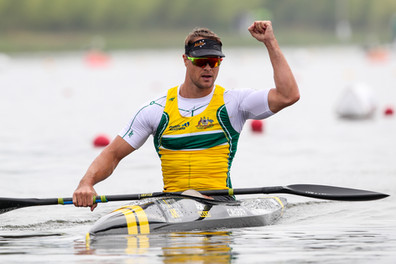Cooling Down with Curtis McGrath
- The Top Ender Magazine
- Nov 30, 2021
- 5 min read
Updated: Nov 3, 2025
During his well-deserved, cool-down following the Tokyo Paralympics, we had the privilege of chatting with gold-medal winner and Army veteran, Curtis McGrath!
Can you describe the experience of winning Gold at the Paralympics?
I won gold at Rio and Tokyo Paralympics, however both experiences were different for me.
In Rio, I had so many supporters behind me and no idea what to expect after 4 years of blood, sweat and tears (literally). Knowing how many people had helped to get me to the games and then onto the winners’ podium was surreal, however it didn’t come with the excitement and celebration that I thought it would immediately after crossing the finish line. I actually felt relieved.
In Tokyo, it was obviously different with COVID-19 and having an idea of what to expect for the race and potentially winning a medal. I was aware of the pressure and was prepared for the rush of mixed emotion that comes with winning a gold medal – I was extremely stoked and relieved to finally get to Tokyo after being postponed for 12 months. Mental and physical preparation is so important to success on the battlefield and in competition. How do you prepare the night before a Paralympic event?
I don’t change anything or do anything differently. I prefer to be consistent and follow the same process, which is everything I have done over and over as part of my training. I activate my training rhythm – start, finish, breathing etc... I like to be challenged by the potential of winning and never convince myself that I will win. It keeps me motivated and alert.
What is your favourite memory from your military career?
I was an active member of the Army as a Combat Engineer between 2006 – 2012, with 12 months in rehab following my accident. A highlight of my military career was my deployment to East Timor where I was attached to 5RAR while posted to 1CER in Darwin. I really enjoyed making a positive difference and knowing that we were welcomed and appreciated by the local people. We had a great team and we all wanted to be there. I remember visiting remote towns with limited medical facilities and we built them a medical centre – that aspect was extremely fulfilling to know that we were making a real difference to people’s lives.
Were there any skills you learned in the military that you still use today?
Trying to be on time with the right things I need to get on with my day. The old lesson of ‘5 minutes before’ has never worn off and I always strive to be punctual with plenty of time to spare. Communication is also another aspect of my military experience that I still refer to, in terms of learning from things that might go wrong, seeing where you can improve, being open to feedback and using self-reflection to rectify problems and find solutions. As part of my training regime, we have adapted a process similar to an After Activity Report to help me refine and grow as an athlete.
Did you receive much support after your accident in Afghanistan?
I feel lucky. The support I have received, not just from my wife, family and friends, but also veteran organisations who have offered me so much help over the years. There are organisations that I wasn’t aware of who have reached out to me for support, and I have never found it difficult to accept any help as the accident was an extreme change of life for me, and it was obvious that I couldn’t achieve what I wanted to achieve without that help from others. When I was undertaking rehab at Enoggera Barracks within the 12 months after my accident, I would often bump into the DVA Advisor on base, and he was always providing me with information about options that I didn’t know were available to me.
Who has been your biggest influence?
Definitely my wife Rachel! She has been by my side throughout the whole ordeal and always keep me grounded. I am so grateful for her support and belief throughout all of these years.
What advice would you give other veterans who have been injured as a result of their service?
It’s an important time to self-reflect and it’s natural to ask yourself the difficult “what if” questions, but it can lead you into a corner of despair. Within 20 minutes of losing my legs in the Afghanistan accident, I knew that my legs were gone and they were not coming back. I needed to adapt to this extreme change in my life and there was a long road ahead, but I had to remind myself that recovery takes time and I felt much better when I thought about the future with optimism and what opportunities I was going to create for myself. I was focused on continuously moving forward and seeing what was next for me. Ironically, my comrades and I had been watching the promotion of the London Paralympics on the TV at the patrol base around the time of my accident, so I made the decision within minutes of my accident that my mates would see me at the Paralympics. I think that helped me (and my comrades) to see that all was not lost. The future has certainly been bright.
What inspires you?
I am inspired by people who challenge themselves to try something new. It doesn’t matter who they are. For me personally, I maintain motivation by telling people about my goals and ambitions, which then makes me accountable to follow through.
Do you have a hero?
It would have to be Richie McCaw (Order of New Zealand), who is the former Captain of the All Blacks and led his team into two Rugby Union World Cup finals. Being from New Zealand myself, I see Richie as a hero based on his commitment to his team and he never lost sight of his goal to work hard for his team to win the World Cup, despite suffering with a broken foot for the majority of the tournament!
What has been your most significant challenge during your transition from defence?
Although I had a strong and optimistic mindset for my recovery, I had high expectations for my rehab and how quickly I would ‘bounce back’ into life. I had been meeting all of my milestones for recovery and thought that my new prosthetics would be easy. I was shocked at how challenging it was to get it right and feel comfortable. I preserved with the nerve pains and researching options that I had no knowledge of before my accident. I was learning constantly and had no visibility of the path ahead, which meant that I had to rely on a lot of support and professional advice to find the right solutions for me.
Whats your favourite quote?
Be humble - you could be wrong. In all aspects of life, it’s important to understand yourself and that other people may be better at something.
What’s next for Curtis McGrath?
I will be taking a year off next year to do some personal development, continue with my Uni course and do some public speaking. Then, preparing for the 2023 Paracanoe World Championships.
































